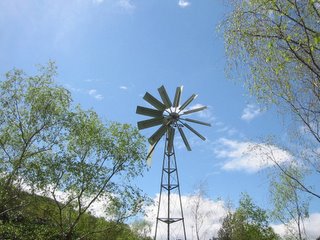
The problem with alternative energy sources is that they're either periodic (like tides or solar) or unreliable (like wind). The one exception is hydropower.
But isn't this the biggest obstacle to the wholesale adoption of renewables in the near future?
Well that was how I thought until my brother-in-law pointed out that every unit of renewable enery produced is a unit of fossil-fuelled energy saved. Blindingly obvious, of course, but I hadn't quite got into thinking that way. I had been commenting that all renewable generators required a battery or back-up system which was expensive and likely to depend on fossil fuels - or nuclear power. None of this alters the basic premise that a unit of energy produced (by, e.g., the turbine on your roof) is a unit which doesn't need fossil fuel to make. I repeat myself, I know, but then this is so fundamental, it needs to be repeated. And the argument about back-up sources really isn't very critical since the fossil-fuelled kit (power stations) already exists. Better weather forecasts mean that extra capacity needs can be anticipated well in advance so that boilers and turbines - not something you can swtich on and off at will - can be started. The aim, after all, is not to cease burning all fossil fuels, but to reduce their use by 60-80% to help stabilise the climate.
What's more, the larger the transmission grid (I know there are losses here), the more it can be used as a 'battery'. Gales in Scotland mean surplus generation for that part of the country which can be 'exported', via the grid, to areas of calm. Indeed, such grids cross national boundaries (like the connection between France and the UK) which enlarges the scope of renewables even further. Perhaps it would be feasible for large scale solar electricity to be produced in hot deserts like the Sahara, at the same time giving those countries a new exportable commodity.
Like I say, every little helps...